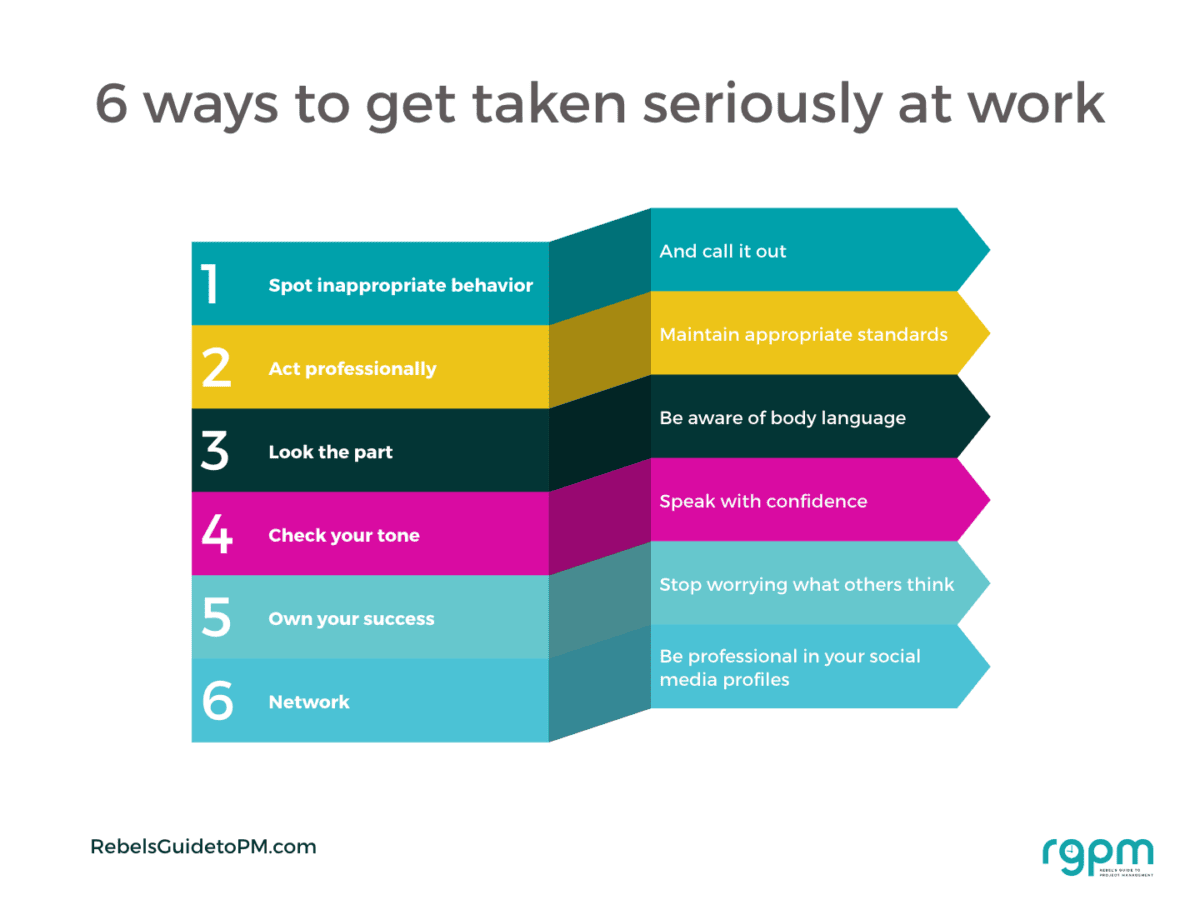When you’re the youngest person in the room, or in the minority in some way, or just new to your role and trying to make the best impression possible, sometimes it feels like you aren’t being taken seriously at work.
I often hear from people who worry about not being considered a serious player in the office. Young women seem to suffer the most – at least, I’m most aware of it affecting that group – but it seems to hit everyone at some point.
Getting taken seriously at the office is something that you can work on. It isn’t always easy to build a sense of gravitas (especially when faced with more senior colleagues) but you can get better at coming across in a way that makes people take you more seriously.
Here’s the tried-and-tested career advice we gathered from experts so you can master the habits that will propel your career forward.

1. Be good at what you do
Being credible means being good at what you do.
“In today’s fast-paced work environment, showing up and delivering results is key,” says Albena Georgieva, Head of Partnerships at BusinessMap.
That doesn’t mean you have to be an expert from Day 1. Be reliable, do what you say you are going to do, follow through on your promises and communicate effectively if you can’t finish something you said you would.
You don’t need industry knowledge or work experience to have integrity.
2. Find a mentor
Behind every successful person is a mentor.
“While it’s ideal to be taken seriously in your own right at work, a key building block here should be finding an advocate or mentor; someone who is well-respected and will listen to you and advocate for your ideas in the face of skepticism from upper-level management,” says Soumya Mahapatra, CEO of Essenvia.
“It’s important to remember that this is almost always an issue of personalities; good leaders take good input from anywhere they can get it, so the trick to thriving in an environment like this is finding the right personality to work with.”
It’s sometimes easier to find an out-of-office mentor, someone who doesn’t work within your organization. Book an hour with me and we can cover all kinds of career development topics.
3. Build your EQ
Embrace the power of Emotional Intelligence: High EQ is a substantial asset.
“EQ enables you to manage your emotions, understand others’ perspectives, and navigate social networks at the workplace,” says Albena. “By showcasing empathy, understanding, and effective communication, I have been able to foster some of the most impactful collaborations.”
Work on this, and you’ll find that great relationships with colleagues come easily.
4. Understand the bigger picture
Look for opportunities to build your understanding of the bigger picture.
“It can be easy to focus on your own specific area in a business without consideration for the challenges that others have to face,” says cybersecurity expert Andrew Lugsden from ForgeSecure. “The sales team, accounts department, and IT team can each have different problems and issues when working together on a project.”
Understanding your coworker’s perspective can help with cooperation and allow you to suggest strategies that work for everyone.
Maintain an understanding of the business as a whole and the different pressures that each department may face. Your stakeholders will appreciate that you are building your business acumen and have a broad view of the challenges they face and can put business issues and project work into context.
5. Dress the part
Looking right for the situation is really important. No one will take you seriously if you turn up to a meeting in a track suit – unless you’re a sports coach.
“Your appearance shows that you are important,” says Jen Seran, Director of Business Operations Stallion Express. “Make sure you look good and dress properly for your workplace.”

Dress professionally, but modern workplaces have very different interpretations of what professionally means.
When I was younger, I looked at how the women in the jobs senior to me dressed, and did my best to match in with those. However, you’ll have to work out what is appropriate for your workplace.
Looking at what your well-respected, confident colleagues wear is a good starting point. If it’s casual clothes, well-turned out, with clean nails, hair and glasses (if you wear them) then match in, within reason.
What you wear in your home office, in an environment with colleagues or at a client dinner is going to be very different, so switch up your outfits to match the situation.
“Remember that you should be yourself and not try to be someone else,” says Jen. “Being authentic is important to be respected and taken seriously at work.”
6. Watch your body language…
I had a tendency to talk quickly and walk quickly, and to a certain extend I still do.
However, if I know I need to make a good impression and get taken seriously, I slow down my talking. Your body language makes an impression on people
Unfortunately, it’s easier to give body language advice than it is to follow it, so it’s something you’ll have to work on. For example:
Keep your head level – don’t tilt to one side as that looks curious, not assertive.
Don’t bob your head – nod in appropriate places but not too much. You’re going for active listening, not taxi cab doll.
Make eye contact – but again, not too much. Some people find eye contact difficult, so be aware of who you are talking to and go for friendly, not threatening.
We used to talk about having a firm handshake, but I don’t remember the last time I shook anyone’s hand these days! If you are in and industry where handshaking is the norm, make sure you approach the shake confidently.
This is a great video about the power of body language: it doesn’t just affect how others see you, it changes how you see yourself with power poses.
7. Think about tone of voice and what you say
“Ensure your thoughts, ideas, and worries are understood,” says Jen. “To start important conversations, learn to listen and ask thought-provoking questions actively.
Here are some tips to build a strong reputation as a confident speaker.
Keep your voice level – don’t raise your voice at the end of a sentence as that sounds like you’re asking a question rather than making an assertion.
Use the words that you need to get understood – which usually means toning down your project
You might find yourself in a team that uses a lot of sports
You can find office cultures that don’t rely on you having to know the scores from weekend matches.
8. Show what you are capable of every time
Don’t expect people to have heard about your past projects or read your LinkedIn profile.
“In the wedding and event industry, you are constantly working with people – be it in person, or working in an office and making arrangements for the event,” says Aurelija Gintaliene, event planner, COO and Co-founder of Breezit.
“Your event portfolio, recommendations, and reviews should be able to speak for themselves, but we often come across people who downplay your abilities, especially if you are working with them for the first time. Treat every project like it is of paramount importance.”
“You have to take on a ‘proof is in the pudding’ stance,” she adds, “and give them a taste of what you offer, endeavor to go the extra mile at all times to show that you are capable of everything your supporters say, and more.”

9. Keep learning
“The world changes rapidly and so should our knowledge base,” says Albena. “As someone with various certifications, I’ve found that showing a commitment to personal and professional growth not only garners respect but also opens doors to new opportunities.”
Look for opportunities for advancement and projects you could take on that would help your personal development. Seasoned professionals do this too: you should never stop learning!
10. Call out colleagues respectfully
When you see or hear people falling short of high standards, think about how you are going to call them out.
Don’t do it in a public space or in the middle of a meeting. Maintaining boundaries and dealing with difficult situations professionally is part of being taken seriously as a leader.
If you want to know how to provide feedback about someone’s behavior or performance, this guide to giving management feedback will help.
11. Use your tech responsibly
You’ve got tools to do your job – so use them. But remember there are boundaries at work.
Don’t be the person who watches the big sports match on YouTube while in a Teams meeting – I’ve seen people react when a goal is scored and get called out on it. Multi-tasking doesn’t work very well for work-based tasks. It’s even less effective when you try to do personal stuff at the same time as work.
“It can be wise to limit your AI usage,” says Edward Tian, CEO of GPTZero. “While you may want to get your tasks done as quickly as possible in order to demonstrate your efficiency as a worker, and AI can be a very helpful tool, this isn’t always viewed favorably by all employers.”
I think it goes without saying that you should keep confidential data off ChatGPT or other publicly available AI tools.
“Some employers view AI usage as cutting corners, or they assume that a worker using AI can’t actually complete the tasks on their own,” Edward adds. “Even if that’s not true, you just want to make sure that your tech usage isn’t contributing to those false perceptions which in turn make it so that you aren’t taken as seriously as you’d like at work.”
Make sure that you’re using all the privacy settings you should be using. Keep confidential documentation confidential, and purge your social media of pictures you should never have put on there in the first place.
12. Own your success and your mistakes
Own your success: career progression gives you the option to control your finances and do so much more with your life outside of work as well as making an impact for good in your organization.
Own your mistakes as well. “When you mess up, own it and learn from it,” says Jen.
That’s as easy as admitting the mistake, saying sorry and asking what needs to be done to put it right. It doesn’t have to be a big drama.
13. Network – in a work-related way
Build strong networks as these people can advocate for you.
“Building strong relationships both within and outside the company has been key to my success,” says Albena. “I can vouch for the value of a robust network in gaining credibility and establishing professional legitimacy.”
“Every event or project we work on has different elements and you meet different people with different attitudes all the time,” says Aurelija. “The key we find, is to give your best effort at all times.”
Networking is so important (read why here). The people you work with really do make a difference to how you are perceived at work.
Don’t be crushed by imposter syndrome
Not being taken seriously, combined with the feeling that you really don’t know if you deserve your success (that’s Imposter Syndrome), conspire to make women less successful at work than they really should be.
You’re responsible for overcoming that. The bottom line – in my opinion – is that if you aren’t taken seriously, and you know you are doing all the right things, then that company isn’t for you.
Don’t struggle to change organizational culture on a one-woman crusade. Find somewhere where you can flourish, and where people treat you in the professional way you expect.
This article first appeared at Rebel’s Guide to Project Management






